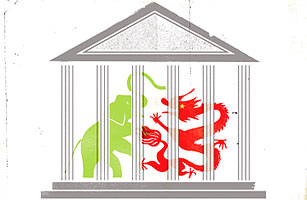
(2 of 2)
Money Talks
Beijing's stimulus effort also exposed another Chinese weakness — a faulty, immature financial system. Though the state owns large chunks of the banking sectors in both countries, China's bureaucrats interfere much more intrusively in the credit decisions of its financial institutions, turning them into little more than arms of government policy. That makes Chinese banks more vulnerable and less efficient in allocating resources. Indian banks, on the other hand, are run on a more commercial basis. They have greater expertise in risk management and credit analysis, and as a result, they tend to lend money more intelligently and have stronger balance sheets. We cannot understate how important that is for India's future performance. "Indian banks are stronger [than China's]," explains Mark Young, head of Asian banks at rating agency Fitch in Singapore. "There is a clear link between the health of the banking sector and the capability to support economic growth."
India's corporate sector beats out China's too. Indian companies are more dynamic, better managed and financially sounder than Chinese enterprises. According to data crunched by investment bank CLSA, Indian firms outperform China's, with both wider profit margins and higher returns on equity. That's not about to change. Chinese corporations are not only burdened by more debt, they are adding debt at an alarming rate. Fitch figures that at the end of 2010, bank credit represented 139% of GDP in China compared with a mere 49% in India.
We can also make the case that India is more entrepreneurial than China. Indian firms like Infosys, Tata Consultancy Services and Wipro practically invented the entire offshore IT-services industry — a sector China is now attempting to copy. At their ever expanding campuses, these companies train and absorb thousands of new hires each year while extending their reach to every corner of the globe — management challenges Chinese executives would struggle to tackle. Arvind Subramanian, senior fellow at the Peterson Institute for International Economics in Washington, D.C., says the evidence can be found by evaluating how companies from China and India operate outside their home markets. Indian firms, he notes, not only invest more heavily overseas than China's (as a percentage of GDP), but they also tend to operate core manufacturing and service businesses in advanced economies. China, meanwhile, has focused outward investment on natural resources in Africa and other emerging economies. That, Subramanian contends, shows Indian managers can better compete head-to-head with the world's top CEOs in the most demanding markets.
Such management expertise will prove decisive as China and India lose their low-cost competitiveness. The only way either economy can keep growth roaring is to develop high-tech industries and innovative companies — a difficult leap that demands the type of smartly run companies India already has. It also requires democracy and civil liberties. By censoring the Internet, controlling the press and stifling debate, Beijing is suppressing the open exchange of information and risk-taking spirit necessary for entrepreneurial innovation. Indians, enjoying full freedom of expression and association, face no such hurdles. These basic rights in India, furthermore, are protected by an independent judiciary that can be trusted to uphold the rule of law — a crucial ingredient for economic progress.
Whether you believe India or China will own the future depends on whether you think the state or the market can generate the best economic results over the decades to come. True, China's government is more competent than India's. But can China's bureaucrats take the economy into the ranks of the most advanced? History tells us the answer is no. I dare you to name one example of an authoritarian, state-dominated economy that developed creative, innovative industries and world-beating companies. China faces that risk. On the other hand, we can make a long list of democratic, market-oriented economies with well-managed private companies that have excelled. There is every reason to believe India will be one of them.
So don't be fooled by Shanghai skyscrapers and Beijing propaganda, or misled by the chaos of Mumbai's streets and India's tendency for self-deprecation. China's state may give it an edge today. But India's private economy will give it the edge tomorrow.